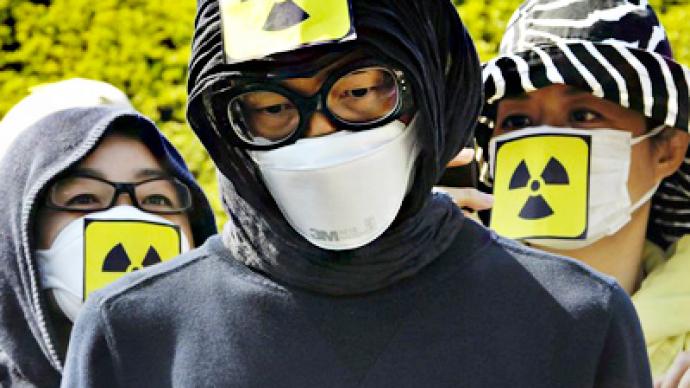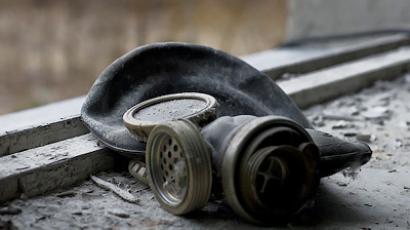“I don’t think the end of Fukushima accident is in sight”

Philip White, from the Citizen's Nuclear Information Center, says that the situation in Fukushima is worse than the plant's owners are willing to admit.
“It is some sheet material that they want to cover the plant with, to minimize releases of radioactive gasses into the outside. In fact I think they will find it very difficult to achieve that. I don’t think the end of the accident is in sight,” he said.There is no talk of people returning to their homes within the exclusion zone any time soon, believes White, stressing that recently the Japanese government had placed a ban on returning to that area. What was a loose exclusion zone, where people were not allowed to stay but could travel in and out, has become a strict exclusion zone with fines being imposed for people returning there. Asked if the Tokyo Electric Power Company was reliable, White replied, “I would not be surprised about anything with TEPCO. There are many people in government who are closely affiliated with TEPCO one way or another,” he stressed. “And the bureaucracy has never been strictly monitoring them. There are few areas that are still uncertain and we think they might be covering up some details, but I think all of this will come out as time goes by. At this stage it is more a matter of the analysis that they put on their data, they minimize the seriousness in their statements, they don’t fully wish to recognize just how serious [the situation] is.”
The Fukushima and Chernobyl nuclear disasters are quite different from a technological point of view as there are considerable differences between the causes of the catastrophes in each case and, furthermore, the equipment at the two devastated nuclear power plants is different, says independent journalist James Corbett who is in Osaka right now.What also divides the cases is that in the Soviet Union, after it became evident that information about the catastrophe in Chernobyl could not be hidden under a rug, the information about the liquidation of the aftermath of the disaster was absolutely open to the international community. The situation in Fukushima is the opposite: the Japanese authorities censor the information about what exactly is going on at the devastated nuclear facility and share it with only a limited number of organizations.“The [Japanese] government has proven that it is not interested in giving free and open access to the [Fukushima] site or the information coming out of there,” he said, adding that briefings on the situation “are only open to a selected group of Japanese media organizations – and foreign media and independent journalists are being excluded from those meetings.”
The director of Atomic-energy.ru website, Pavel Yakovlev, does not think that Fukushima-1 crisis can be called a case of negligence.“Since Chernobyl, there have been serious improvements in the nuclear safety. It is by far the most regulated industry: we have to undergo very serious and detailed paperwork acknowledging and describing potential risks and hazards. In the last 25 years we have considerably improved safety, efficiency and power output,” says Yakovlev.Nevertheless, Yakovlev does not believe that putting a sarcophagus over the Fukushima-1 will mean the end of the trouble."The Japanese authorities need to maintain and develop a unique in-depth decommissioning plan and they will have to take all the radioactive material out of there, and safely store it, minimizing its volume," says Yakovlev. This operation, he concludes, is likely to draw out to well over the six month period which was the lower limit to resolve the crisis, as estimated by TEPCO.
Professor Christopher Busby, the Scientific Secretary of the European Committee on Radiation Risks, believes that the Japanese have been very lax in the way they evacuated people from the exclusion zone. He thinks that the zone should be expanded to a 60-70km radius. Busby thinks that if a sarcophagus is put over Fukushima-1, the nuclear fuel might go underground and get washed away by the sea. The US has already started picking up contaminated material with high concentrations of uranium and plutonium washed up on its coastline, he says.Christopher Busby also thinks that TEPCO has concealed the fact that one of the explosions at Fukushima was not a gas blast, but a nuclear reaction. “The nuclear industry has a history of duplicity and cover-up. I believe it probably was a nuclear explosion, not in the reactor, but in the tanks that contains the spent fuel. It seems almost certain now that there was some kind of nuclear explosion in the tank that contained the plutonium fuel rods. Anyone who saw that enormous explosion on the video would not have believed that it was a hydrogen explosion,” says Busby.
Professor Tom Burke, a founding director of the sustainable development company E3G, says that TEPCO has not yet regained full control of the reactors and there are still risks of further explosions or releases of radiation.“They have got a bit more manageability than they had earlier on, but this event is still ongoing,” he said. “The Chernobyl event was over very quickly, it was an explosion and it was over relatively quickly. This is clearly going to run and run for months.”Burke believes that regardless of the catastrophes of the past, nuclear plant operators have still not learned their lesson.“What is very clear from what happened in Fukushima is the Japanese, neither the utility nor the government, really had a well worked-out and thought-through emergency plan to deal with a catastrophic event like this,” he said.














